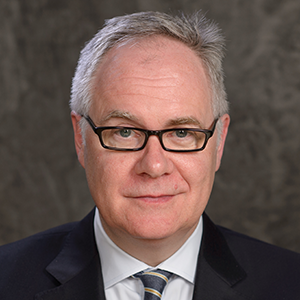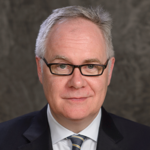
14 Jun Interview with Calum MacRae of Harvard Medical School

Calum MacRae works on the human genetics of cardiac and vascular disease, cardiovascular developmental biology, and drug discovery. He has a longstanding interest in the incorporation of genomics and other large-scale datasets into clinical practice, systematic approaches to the discovery of new translatable phenotypes, and the role of disruptive innovation in refashioning the translational interface. Read his full bio.
Interview with Dr. Calum MacRae, Vice Chair for Scientific Innovation, Department of Medicine at Brigham and Women’s Hospital and Harvard Medical School
Q: What patient data do we need to better understand the underlying cause of disease and how to prevent it?
A: Medicine at present is highly underdetermined and data poor. To be precise, one must be comprehensive, so medicine (with our consent) will use not only what we currently conceive of as biomedical information, but also data from across our lives. Essentially any data that might inform us about any aspect of the disease and the patient. We will also have to incorporate many more longitudinal or continuously streaming data types to create the type of immersive surveillance and precise personalization that we have promised. This agnostic approach will be very similar to the mass customization approaches used in many areas of our lives including search, retail and entertainment.
Q: What is wrong with the way we collect patient data today?
A: We collect data episodically, late in the disease process and in very non-standardized ways. Importantly, we also do not collect the biological ‘transactions’ in medicine, the metadata that we need to really transform medicine.
Q: How AI and machine learning can improve patient care?
A: With the massive change in the scope, scale and velocity of data collection in medicine that we have discussed, combined with an exponentially increasing knowledge base will need to augment our ability to integrate, analyze and interpret all of this information on the right timescale for continuous and precise care. AI/ML will substantially complement the clinician and the medical system by allowing these data streams to result in real time insights at an individual patient level. This may be in many ways for example through automating processes such as image analysis or the triggering of interventions, or through novel predictions enabling us to identify biologic signals that were previously inaccessible. Perhaps simply by creating time for clinician and patient interaction we will be able to reimagine medicine.
Q: You are the recipient of the prestigious “One Brave Idea” Award. Can you please tell us about the project?
A: The program is focusing on the original goals of the award the identification of novel objective approaches to defining cardiovascular wellness and the earliest deviations from this. We have a wide range of efforts designed to exploit existing data types in new ways or to create entirely new data types that can identify atherosclerosis early in life. By studying these early states, we can begin prevention much earlier, discriminate different forms of atherosclerosis and then discover novel upstream pathways to target with novel therapies. We are also studying ways to accelerate the implementation of novel technologies and insights into broad utility.
Q: How better understanding of the association of human genetics and cardiovascular diseases will change clinical care?
A: Genomics are already informing the management of many different forms of cardiovascular disease, through the identification of disease mechanisms or via the imputation of polygenic risk for common diseases, but as new molecularly targeted treatments or other interventions, they will become an increasingly central part of decision making in clinical care. We are rapidly approaching the point where a whole genome sequence will be a central part of the medical record. It seems to me that given the fact it is the only bounded dataset in biology, the genome may be the only cohesive framework for the personal health record.






